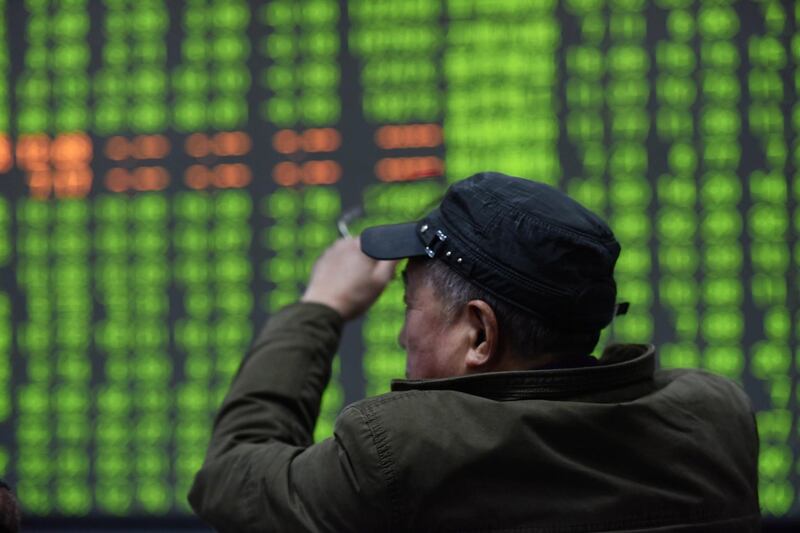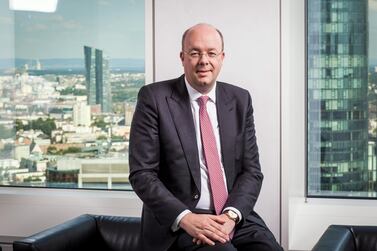Deutsche Bank remains cautious on Chinese equities as it awaits more information on the economy and the coronavirus outbreak, according to the global chief investment officer of Deutsche Bank's wealth management business.
The bank has adopted a "wait-and-see approach" for now, but a decline in the rate of infection could be a yardstick for investors to look at the market again. "We have a lot of investors who wanted to go into China but said they will wait for a correction," Christian Nolting told The National. "Now you have a correction but timing wise, of course, it is tricky [deciding] when to enter."
The spread of the coronavirus has so far claimed more than 1,350 lives and infected almost 60,000 people. Fatalities by the coronavirus have surpassed those from the Sars outbreak in 2002-03.
Sars killed 774 people and infected almost 8,100 people in 26 countries over eight months, according to the World Health Organisation.
China's economy, which decelerated last year on the back of its tit-for-tat tariff war with the US, is expected to slide further this year as the virus outbreak temporarily halts operations across factories and disrupt supply chains.
Stocks in China dropped about 8 per cent on February 3 when trading resumed after the end of an extended Lunar New Year holiday. It was the worst drop since 2015 when a massive sell-off wiped out $3 trillion (Dh11tn) from the stock exchange.
Stocks have since gained some ground, but a meaningful recovery is far from certain. Shanghai composite has dropped 6.9 per cent in the past month. Shanghai’s CSI 300 Index and Hong Kong’s Hang Seng index are down 6 and 4.7 per cent, respectively, for the same period.
On February 2, China said it was injecting 1.2tn renminbi (Dh635 billion) into its financial markets and lowering interest rates on reverse repurchase agreements by 10 basis points. It has also halved tariffs on $75bn worth of US goods on the back of a phase-one trade deal last month.
Mr Nolting expects China to introduce more such measures.
“We have seen measures on the monetary policy side but I would also expect some measures on the fiscal side,” he said. “The first quarter numbers are going to be important as I guess implications [of the virus] are going to be mostly in this quarter.”
The coronavirus will curb consumer spending in China, and its impact on economy will be greater than Sars, Moody’s Investors Service said last week. Deutsche Bank now expects a 0.4 to 0.5 per cent revision in its earlier 5.8 per cent 2020 growth projection for China, Mr Nolting said.
Other banks have made similar estimates.
“It is a substantial amount calculated on the basis of the outbreak abating in the first quarter,” he said. “If the outbreak drags on longer, then this number needs to be revised. The [economic] implication will be greater,” he added.
China's share of the global economy has grown since the Sars outbreak. It currently accounts for 17 per cent of global GDP and 13 per cent of global trade, up from 4 per cent and 5 per cent respectively in 2003. The US Federal Reserve on Saturday cautioned that the coronavirus presents a new risk to the global economy, echoing concerns of the head of the European Central Bank, Christine Lagarde, who said the virus risk has now replaced the US-China trade war as the top economic challenge.
How to protect yourself against coronavirus

Deutsche Bank expects the slowdown in China to shave off 0.2 to 0.3 per cent of the global economic growth this year. The lender estimates global GDP to expand slightly above 3 per cent in 2020, in line with the estimates of the IMF.
“If at the end of the first quarter we are okay with the [virus outbreak] situation, the impact on global growth will be limited. If it takes longer then the impact will be higher,” Mr Nolting said.
However, despite the current headwinds, Deutsche Bank remains positive on Asian equities in general. It is underweight on European equities and plans to redirect funds from divestments in Europe to emerging markets, especially in India and China.
“Asia is one of the fastest growing regions in the world, if you look at India and China,” Mr Nolting said. “We have reduced exposure to European equities and these proceeds will go to the emerging market equities.”
Deutsche Bank expects eurozone economy to grow by only 0.9 per cent this year. The uncertainty surrounding the ongoing trade negotiations between the EU and the UK, he said, is affecting economies on both sides.
“It is weighing on economies …. more so on the UK. If trade [issues] takes a long time to be sorted out, I wouldn’t rule out a recession in the UK,” Mr Nolting said.
The likely scenario, he added, would be that the EU and UK would engage in “very tough negotiations in the fourth quarter of this year” and the two sides may opt to finalise just the main trade issues and leave the rest for later discussions.








